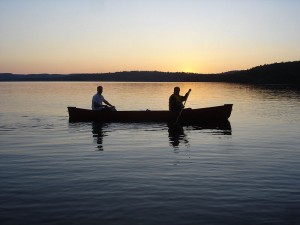Navigable waters in Canada – an update

Canoeing in Algonquin Park, Ontario. Photo: Acqumen Enterprises, Creative Commons, some rights reserved.
“Navigable waters” is an awkward mouthful. Not a very sexy topic to the average layperson. But for some landowners and paddlers, them’s fighting words.
Why? Because if a waterway is considered navigable, that comes with distinct rights to float, paddle or motor through, even if the surrounding land is privately owned.
Setting aside how that all works in law in the U.S., this post is meant to highlight a shift in Canadian policy on that issue.
According to a CBC exclusive of July 13, something called the Navigation Protection Act has replaced the older Navigable Waters Protection Act. (I know, they sound the same.)
CBC’s David McKie reports the newer measure (passed as part of an omnibus budget bill last year) will significantly reduce the number of waterways where development would be considered interference with navigation. According to the article, the change means…
The rest of the waterways, about 98 per cent of all rivers and lakes in Canada, now have no federal protection, which means an individual or group that depends on a waterway for recreation or livelihood would have to go to court to challenge a development it believes impedes navigation.
Environmental organizations consider this a step backwards.
“Before these changes, the federal government acted like a watchdog, guarding the public’s right to use all Canada’s navigable waterways and balancing the public’s interests against those of industry,” says Anna Johnston, a lawyer with West Coast Environmental Law.
“The changes effectively cut the public loose, leaving Canadians to stand up for their rights on their own in David-vs-Goliath fights against industry and, depending on the case, against the government itself. Not only do the changes bring more uncertainty, but they also skew the fight.”
According to Canadian Press coverage by Heather Scoffield from 2013, much of the pressure for those changes came from pipeline industry interests. As quoted by the CP, NDP environment critic Megan Leslie said “I never really knew where this call for change came from”. The changes did generate opposition at that time, but with a majority of votes, the Conservative budget containing those measures passed. In Leslie’s view:
“It was never in any documents, it was never an addendum to testimony or anything like that. And in some private meetings I’ve had with some industry reps, they too have expressed to me that they don’t know why the Navigable Waters Act changes were made.”
While Leslie said it’s perfectly acceptable for industry groups to present the government with lists of policy recommendations, “what’s not normal is that those changes are accepted holus-bolus, without any consultation.”
In some respects, this is old news in as much as the law in question passed last year. The current CBC article was prompted by briefing notes obtained by CBC news that say the changes will produce more court challenges ahead.







